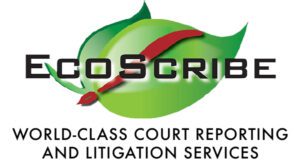EcoScribe – Court Reporting Experts
Remote Depositions

What is a Remote Deposition?
A remote deposition is an online legal proceeding in which a court reporter, attorney, and witness can connect via video conferencing with reliable security and confidentiality. This online approach eliminates the need for all participants to be physically present in the same location. It saves time, money, and travel stress by allowing people from anywhere in the world to participate in digital court proceedings.
EcoScribe also offers the option of having a technical specialist present your exhibits for you for a small fee if you are uncomfortable with doing it yourself.
Benefits of Remote Depositions.
Remote deposition services offer numerous benefits in contrast to traditional court reporting deposition services. They offer convenient and easy access for participants, eliminating the need for extensive travel or travel expenses. Additionally, remote depositions typically record video footage of the proceedings, making them easier to review and verify accuracy later on. Finally, remote depositions help maintain social distancing guidelines and create a secure environment with minimal risk of disruption or contamination.
How Do Remote Deposition Services Work?
Common Challenges with Remote Depositions and How to Overcome Them.
Because remote depositions involve individuals from different locations and different technical abilities, there can be various technical or procedural issues that may arise. To ensure successful remote deposition services, all participants should be aware of common internet connection problems such as lost audio or jitter/laggy video. The best way to overcome these issues is for all parties to test their systems prior to the start of the deposition and ensure that necessary precautions are taken (i.e. automatic backups, offsite recording). Additionally, a qualified moderator should always be available in case any unintended misunderstandings occur during the proceedings.
